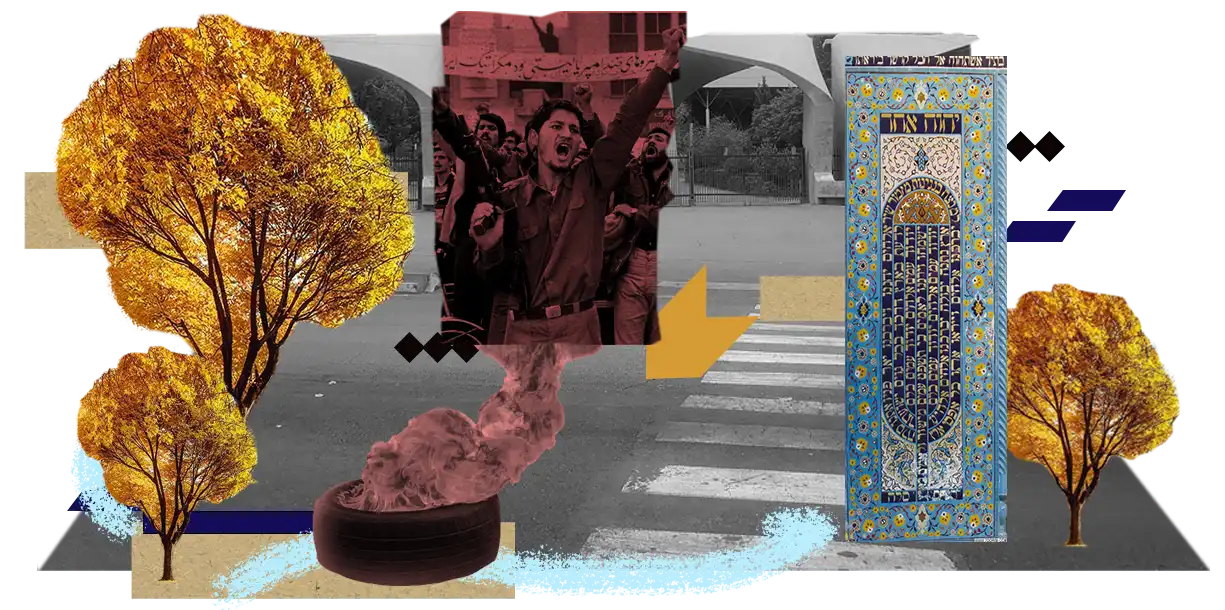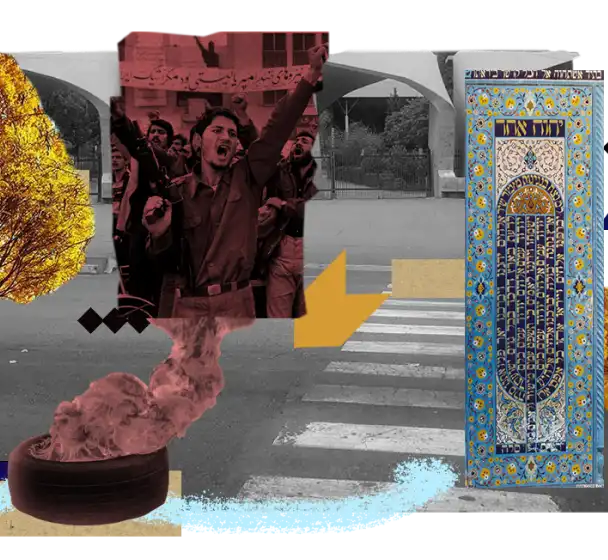I still recall vividly that crisp fall morning in 1978 when my father drove me from our house in the suburbs of Tehran to my Jewish day school in the center of the city. Such was our routine. This particular commute, however, was unlike any other that had preceded it. My father was anxious, his head on a constant swivel as we inched closer to the heart of downtown. Tires smoldered on sidewalks after having been set aflame. Groups of young men stalked the middle of streets chanting, “Death to the Shah!” The scene felt especially threatening to a 10-year-old, which I was at the time.
My father then began a conversation I now know many Jewish parents around the world have had with their children. “If our car comes under attack,” he said to me, “just duck down and hide. Once in school, don’t sit near the window in your classroom.”
Only a couple of weeks after that frightening morning, my parents, siblings and I were on an airplane headed to Israel, never again to return to Iran. Within a few months, the fundamentalist Islamic regime that took over Iran jailed and ultimately executed one of the most prominent leaders of the Jewish community, Habib Elghanian, accusing him of dual loyalty while branding him a Zionist spy and “corrupter on earth.”
One tragic aspect of my family story is its ordinariness when compared to Jewish stories throughout the millennia — being forced to make the excruciating decision to leave their country and homes, most often overnight and with few possessions. It dates back to the Passover story when our ancestors fled the confines of slavery in Egypt more than 3,000 years ago.
My own childhood memories of exile, along with my past professional experience serving as the head of international affairs for the Anti-Defamation League, has proven to me repeatedly that the Mizrahi and Sephardic experience — ancient, medieval and modern communities surviving waves of tolerance and limited inclusion at best of times, and persecution, expulsion and massacres at worst of times — represents both the broader Jewish narrative as well as the unique Mizrahi/Sephardic tale.
One tragic aspect of my family story is its ordinariness when compared to Jewish stories throughout the millennia — being forced to make the excruciating decision to leave their country and homes, most often overnight and with few possessions. ”
Yet so much of the Jewish story has been bereft of that unique lens, including our understanding of modern antisemitism in Muslim majority societies, and Muslim and Arab diaspora throughout Europe, North America and elsewhere. In my work at ADL, where I was responsible for advocating on behalf of Jewish communities around the world, I found that in Europe today, Jewish communities seek to find allyship with Muslim communities on shared communal concerns, such as legislation banning male circumcision and ritual slaughter.
However, the lack of willingness by European Muslim community organizations to partner with Jewish communities to fight such legislation is in large part an outgrowth of deep-seated and historic prejudice and distrust of Jews prevalent for centuries in the Middle East. So today, across Europe, even working toward a shared goal is frowned upon. However, I firmly believe that it is because of our shared cultural heritage that we can seek to build bridges and allyship with Middle Eastern diaspora communities across the world. It is not easy, but we should not relent.
Incorporating the unique Mizrahi and Sephardic lens is critically important today as we seek to understand the disconcerting rise in global antisemitism, including in the U.S. I remember the first time my mother told me about the harsh realities of life for Iran’s Jews of her grandparents’ generation: Jews being viewed as najis or impure, forbidden by law to leave their homes when it rained or touch fruits at the market. My widowed grandmother, herself a refugee in Iran from Russian pogroms of the early 20th century, had to take on an Armenian last name in order to be allowed to find a job to support her two young sons.
My father’s childhood stories demonstrated slightly greater tolerance, but of life still confined to the mahale, the Jewish ghetto. Perhaps the greatest advancement of his generation of Jews was the ability to achieve economic success and build lives outside the mahale. For my father, that meant constructing a luxurious estate for our family in an upper-class neighborhood of Northern Tehran in the mid-1970s — only for the Islamic Revolutionary regime to take it all away, including his business assets, a few years later.
Today, the Islamic regime has taken it upon itself to destroy any remnant of the old mahale, along with the ancient, cramped synagogues and bath houses, while its chief propaganda target is aimed at the very existence of the State of Israel and unwavering Holocaust denial. The diffusion of disinformation regarding the Holocaust and Israel has become a major activity of the regime, spreading falsehoods across regime-controlled media, as well as holding international Holocaust denial cartoon contests. The regime seeks to delegitimize the Jewish State by questioning what it deems as the founding motivation for it, viewing Jews as not indigenous to the land and instead as European colonizers. It does so in the face of the history of Persia’s King Cyrus having set Jews free from Babylonian captivity and facilitating their return to the promised land, which resulted in the building of the Second Temple in Jerusalem.
Despite the dearth of Jewish communal life in Middle Eastern and North African countries due to mass forced displacement, those historic prejudices manifest today as anti-Jewish and anti-Zionist ideology that emanate from the Middle East and spread. Aversions to Jewish nationhood and the right to self-determination can be seen as modern-day manifestations of classic antisemitic intolerances used against Jews — Iran’s najis laws of my great-grandparents’ generation being a prime example. Israel — the only Jewish State among the community of nations — suffers the indignity of being treated as impure.
Such intolerance continues to permeate the lives of Jews now living outside the Middle East and North Africa — for example, Mizrahi/Sephardic families such as mine in the U.S. — impacting our sense of security, and our ability to be our authentic selves and embrace our full Jewish identity.
My tenure at ADL helped verify that the greatest external physical threat felt by Jewish communities around the world, from North America to Europe to Latin America to Africa, is that of the Iranian regime. Given the recognition of this threat, it is Mizrahi Jews who hold the deepest and most nuanced understanding of the poisoned ideology behind many acts of terrorism, acts for which the regime has had direct and indirect responsibility through its overt support of terrorist groups and the antisemitism it encourages and inspires.
When ADL tapped me to lead its international work on behalf of Jewish communities around the world, I knew that my unique vantage point — not only as a member of a small vulnerable Jewish community, but more specifically as an Iranian-American Jew — would inform my work every single day. My life and work experience assist me in designing tools and programming, advocacy narratives and research agendas to fight antisemitism everywhere, through the unique lens of a Mizrahi Jew. ADL recognized — and I was all too sure of — how valuable and precious that lens is.



